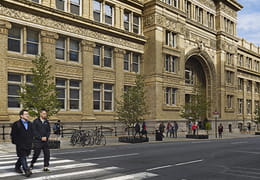Frequently Asked Questions about Co-op
The Drexel Co-op model is based on major-related, paid professional employment for a duration of six months. View a breakdown of Drexel Co-op versus the traditional internship.
The majority of Drexel undergraduate majors include co-op options in their curriculum. View a listing of Drexel's 80+ undergraduate majors and the co-op options.
Learn more about Graduate co-op, including the majors that offer Graduate Co-op.
In the vast majority of cases, the company hiring the co-op student(s) is responsible for compensating the student and covering all associated costs of employment. Drexel does not pay the student for work performed; however, in rare cases scholarship money may be available to help support the student.
Steinbright publishes annual salary information from students in the co-op program. View our Salary Guide to learn about compensation standards for students in the majors you wish to recruit.
The expectation of a Drexel Co-op is a full-time paid work experience; however, some nonprofit employers offer unpaid co-ops, which are part-time work experiences. Steinbright refers employers to their internal Human Resources in determining compensation parameters and encourages review of the United States Department of Labor Fact Sheet #71 for unpaid internships.
The first point of contact for hiring managers interested in the co-op program is Steinbright Employer Relations. All questions related to budgeting and payroll should be directed to your department's Human Resources Business Partner.
Most majors have students available for employment during both the spring/summer and fall/winter cycles; however, certain programs are assigned a particular cycle as determined by their academic unit. Co-op cycles for academic majors are determined by the size of the program, course availability, and the nature of the work that students perform for co-op. Employers should contact their Steinbright partner with questions about recruiting students from a particular major and their availability.
Drexel NCAA student-athletes are assigned fixed spring/summer co-op cycles. If students have particular needs for their team's practice or game schedules, they are advised to notify prospective employers and request co-op work schedule modifications during the interview phase.
Co-op students are expected to work the full six months of the official co-op schedule. There are some special circumstances that may require students to end their co-op prior to the official end date. These Drexel-recognized programs include Study Abroad, Army Reserve Officers' Training Corp (ROTC), and Resident Assistant (RA) training. Additionally, students with certain spiritual/religious needs may ask for accommodations to the official start and end dates of co-op. If students have an extenuating circumstance, it is their responsibility to notify the employer and request co-op work schedule modifications during the interview phase.
Students do not follow Drexel's academic calendar while on co-op and are not guaranteed Drexel observed holidays and breaks while on co-op. It is up to their co-op employer to determine observed holidays and time off during their co-op employment period.
For Undergraduate Co-op, there are three rounds of recruiting (A, B, and C) for each co-op cycle. Students participate in the rounds until they find a co-op placement, and all unpaired jobs roll to subsequent rounds until they are filled. Each round is date driven, with specific deadlines for submitting job descriptions, conducting interviews and making offers or ranking candidates. View our calendars for:
The co-op program has an official start date, but students may be flexible. Depending on their class scheduling and availability, an earlier start date may be negotiated between the employer and the student directly.
Interview rooms are available at Steinbright during the A-Round. Employers wishing to interview on campus must book a room within the SCDConline system during candidate selection. Space is limited.
Contact your co-op advisor or call our main number: 215.895.2185.
Students are scheduled for full-time classes during terms not on co-op. Occasionally, employers retain a co-op student after the end of the term on a part-time basis around the student's class schedule. International students on a work visa are not permitted to continue working part-time after the co-op term. Once graduated, many Drexel co-op students accept full-time employment with one of their former co-op employers. One year after graduation, nearly half of all co-op students had received a full-time offer from a former co-op employer. Check out Drexel's Outcomes and Value.
Yes! Federal regulations permit the employment of international students on F-1 and exchange visitor student J-1 visas, with certain limits.
These students may work off-campus after completing nine months of full-time study and obtaining the proper work authorization from their school's international student office. The Steinbright Career Development Center vets and authorizes that all international co-op students have met the nine months of full-time study requirement.
No, students obtain work authorization as Curricular Practical Training for cooperative education positions from the Office of International Student and Scholars Services (ISSS) at Drexel University. The employer does not need to provide work authorization; students are responsible for completing the process of work authorization.
Co-op employers should be aware of the policies and recommended best practices of the US Department of Justice and the Equal Employment Opportunity Commission as they relate to pre-employment inquiries regarding citizenship and equal employment practices, including refraining from discriminating on the basis of national origin and/or immigration and citizenship status.
Yes, students are permitted to return to the same company if they wish. Ideally the role offered to the returning student will have additional responsibilities in line with the student's career goals.
